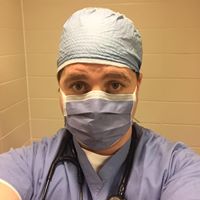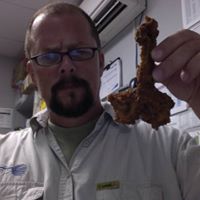Leaderboard
Popular Content
Showing content with the highest reputation on 12/10/2010 in all areas
-
Doing it on the cheap can be hard. The most obvious EMS related things are often pretty whackerish (like a REALLY big keener) and aren't particularly useful. I'm not sure what your price range is but here's a few that to come to mind: - Subscription to JEMS. It's not great for education, but a good trade magazine and helps keep them studying and reading. - Gerber Hinderer knife. Great multitool with window punch, seat belt cutter, O2 wrench. I actually find this one useful. One of the major gift companies will do engraving on the blade for a decent price. - If they're new EMT's looking to move on to Paramedic school, consider a good Anatomy and Physiology text. (This may be too expensive) - Stethoscope. Opinions on what you need/ should spend money on vary. I have a very expensive one I got as a gift from my wife, but there are plenty of passable ones for a decent price. - Going in a different direction, consider a gift card for coffee. (Starbucks, Tim Hortons) Caffeine is the life blood of this industry. If I knew your price range a bit better I could offer some other suggestions.2 points
-
I want a partner who is skilled, and treats patients and family with respect. I want a partner who understand that even when the call is total BS, you do your job, and if necessary bitch about it LATER. I want a partner who understands that part of our job is the education of patients, families, and care givers. I want a partner who thinks that a vital part of our job is to make people feel comfortable when we arrive- that they think we are professional, skilled, and knowledgeable- that our presence will help alleviate their fears. I also want a partner that has the same warped sense of humor that I do, and does not take him/herself too seriously. Luckily I have such a partner. We laugh all day long.1 point
-
Congrats on getting your Medic (well soon that is). As far as traveling overseas to work as a medic there are many things you have to consider. Travel costs to get to where ever you want to work will be a big part of it. But before that many services such as KBR, Saudi Red, Onsite Occupational Health & Safety, and most off shore rigging companies will requir you to have some ALS experience before they will hire you. That also goes for many services whether it be a private service and/or municiple service. I would suggest getting a job locally and get some calls under your belt, establish yourself with the company and sponsor medical control hospitals so you can use them as a reference for future overseas employment. These overseas employers such as oil rig medics usually are high stress, long hour, single medic positions where you have little to no back-up for a considerable amount of time so thats why they are pretty strict in reguards to having experience. The other issue is if you want to travel to another country such as the UK, US, or down under most training is similar but protocol is very different and that country may not offer recoprocity to you to honor your training. Best bet is to contact each countries Office of Emergency Medical Services for recoprocity information. I know in the U.S. each state has their own office I am not sure about other countries. You can go to NREMT.org for a listing of the U.S. "OEMS" offices mouse over the state and click it ot go to that states OEMS page. Here is the link: https://www.nremt.org/nremt/about/stateReciprocityMap.asp1 point
-
Though I'm not sure that I completely understand the rest of what you said above... Yeah, I see that now. My apologies for misreading it before. I do believe that there are other ways to state the opinions that I make, and gentler ways. But I'm not good at those ways, as I try and focus on being clear over being kind, sometimes to the detriment of my goals. Also, if there is a gentler way, I don't necessarily believe that it is a better way. Paramedic medicine in my experience is physically, mentally and emotionally a contact sport. I have had people light into me both guns blazing over decisions that I have made. They don't tend to fare well, as I'm not terribly delicate, but many that come here initially, and many leaving school now, tend to be. I believe that we should feel obligated to help increase all of the necessary skills we all need to succeed in our chosen profession. Being able to accept and respond to productive criticism is one of those skills I believe, and a vital one at that. The "you should be ashamed" comment gave me a little 'ping' when I typed it though it was meant in the "Assie, shame on you for telling that blond joke AGAIN!" vein, though I can see now that it certainly didn't come across in that spirit when typed. Thanks for bringing to my attention. But again, it's my feeling that the OP has more than the necessary intestinal fortitude to say, "Fuck you and your 'shame on you', this is what I was thinking..." and would have been the better for the exchange. And all EMS criticism is very personal isn't it? Unless there is another medic on my truck that I'm unaware of, any criticism that comes from my truck, my care, my decisions or my documentation are aimed at me or mine. I think that that is very personal. And we'll stop eating our young when we teach our young to have enough self respect that they stop walking around looking like snacks, right? Agreed, with one exception. Though it shouldn't be our goal to make others feel bad for their opinions, how often do we see noobs or students post their questions or comments, have them questioned, and then never hear from that person again? Do you feel that it's healthy in our profession to be so delicate that having someone question your thoughts, in an appropriate manner, should create such a debilitating condition that they are unwilling to post a reply? (Not what I think is happening here by the way. Medic school is busy I know, so I'm confident that the OP is busy, not hiding.) Do we help them, or our profession by attempting to wrap each response in velvet so that there can be no possible offense drawn from it? How does one advocate for their patient when they are unable to advocate for themselves? Learning to stand up for yourself and your opinions is a skill not much different than learning to tie your shoes or spoon cereal to your mouth. It needs to be practiced, in different ways, in different places, under different levels of duress before it can be counted on. I tend to find posting here to be stressful sometimes believe it or not!! I have a lot of respect for the opinions of many here and hate it when i come off looking like a monkey fucking a football secondary to one of my best thoughts. But that is the value here too. Thinking before posting has taught me to formulate my thoughts much more clearly and completely before posting, and that habit has infected the rest of my professional life as well. I speak more properly, present myself better because of many of the lesson I've learned here. When we attack our 'young' we teach them insecurity and fear, when we coddle them we teach them to be weak and impotent, I strive for, though admittedly often miss, a middle ground of professional respect, where I neither disrespect them for their opinions nor disrespect them by assuming that they are unable to tolerate adult debate. It is always my intention to treat them with professional adult respect, though at times I do try to challenge those that seem up for it, so as not to let them get bored. I believe that this conversation is an excellent example of what I mean. My post was far from perfect. You attacked it in an intelligent, kind way, and in the very best spirit of what we do here, and I, as well as others I hope, have learned from that. Very little intelligent debate can happen here if people are going to faint at the first sign of adversity, yet too often I seem to see that happening. I'm grateful for your response, and for finding me and my opinions important enough for you to sacrifice time our of your busy day to correct. That's cool as hell. Have a great day all.... Dwayne1 point
-
As someone who has come late, I'd like to add a few thoughts. If they taught us everything we needed to know to be a doctor while in medical school, medical school would run 20+ years. Part of pursuing a (supposedly) professional education (training?) is the ability to learn on your own. It doesn't sound like this case is a protocol issue as much as a management issue. Let's face it, none of our patients ever follow the protocols. You have to be able to think outside the box. Patients never read the textbook or protocol manual before calling 911. I won't argue whether this pt needed 2, 3 or 100 people to manage but in the field you may not have enough people and will have to manage. To the OP, it sounds like your instructor was trying to give you what he/she could before the strike shut everything down, be thankful he/she cared that much and didn't leave you on your own. It also sounds like the instructor did not know about the "protocol" either so how can you hold him/her accountable. In the end, you are an adult undertaking a professional education and failed. Suck it up and deal with it.1 point
-
If the man was in hospital for 2 days before dying, whatever ailed him at the time of the car accident may not have been evident enough for either EMTs or Paramedics to diagnose. The ER staff, or the people on floors might have caught on after you turned care over to them, so it might not even be something covered within our scope of practice. Did the hospital advise you of what happened after transfer of care to them? It might have been something not told you in the patient's history that suddenly went acute. Also, do not jump to conclusions, and tell your classmates that, too. There's the old story of a man went home, early, from a dinner party because he didn't feel well. With the party still in progress, the hostess got a phone call that he died. She rushed everyone, all the remaining 15 guests, to the hospital, where they all had their stomaches "pumped", fearing it was her cooking. Then, they all found out he died, because he got hit by a truck while crossing against the traffic light!0 points
-
The material was not covered in the class. They tried to pass off the protocols as EMR protocols, misrepresenting that the students were required to be conversent with the protocols prior to the course. However, EMA Licencing Board varified that these ignored protocols were not EMR protocols. I think that if shortcuts were taken, and the general public was exposed to serious injuriy hazards, someone should be accountable. One thing I can't stand is a dishonest Paramedic Instructor who thinks he is above the Law. If one of the untrained students killed someone, he would cover his ass, at the expense of the student he chose not to train.-1 points
-
I was the only one presented with this scenario. Just a lazy instructor. It has been 1.5 years and our Paramedic Accademy has been shut down because of a labour dispute. I am in a process to recover my money. Incomplete training and a 1.5 year delay = Breach of Contract.-1 points
-
It was a combination of skills to address airway issues. However, the protocol is irelevant. The fact that it was not taught in class is serious.-1 points
-
British Columbia Paramedic student granted full refund because of 2009 labour strike. The 3,500 CUPE 873 members, who had been on strike since April 1, were seeking improved staffing levels, wage parity with other emergency response workers and a multi-year contract Read more: http://www.cbc.ca/canada/british-columbia/story/2009/04/10/bc-paramedics-talks.html#ixzz17dLMtrM9-1 points





